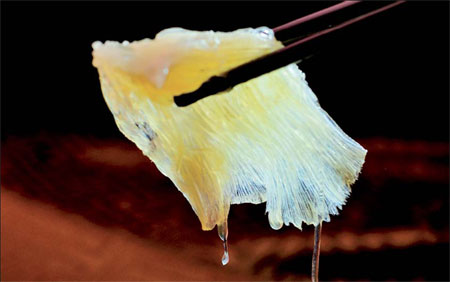China changes its tune
Updated: 2013-04-26 08:41
By Kaitlin Solimine (China Daily)
|
|||||||||||

|
Top: Gelatinous strings of cartilage that make up shark fin soup. Above: Retired Chinese basketball star Yao Ming, also a vocal anti-shark fin activist, says when the buying stops, the killing can too. Photos Provided to China Daily |
Shark fin soup could soon be off the banquet menu
人们慢慢意识到,鱼翅汤并不是婚宴酒席上的"面子"和"好意头", 而是残忍的杀戮.
If you have been invited to a formal Chinese banquet or wedding in the past few decades, it is likely you were served a bowl of soup. Swimming within that bowl of soup may have been translucent strands: chewy in texture, thick like vermicelli and fairly innocuous in taste. If you lifted your spoon and ate a bite, you most likely had a taste of shark fin soup (鱼翅汤 yúchìtāng).
You were not alone, though. Shark fin soup was commonly served at Chinese weddings and banquets as a delicacy and a way of "giving face" (给面子 gěi miànzi), or showing respect to honored guests. Many Chinese who eat shark fin soup do not even know what it is. The Chinese translation for shark fin is literally "fish wing" (鱼翅), so it is not immediately clear to diners that the stringy tendrils are actually from harvested sharks.
As many as one-third of open ocean shark species are currently threatened with extinction, some experiencing a 99 percent population decline.
According to a study published by Shelley C. Clarke in 2006, the shark fin (鲨鱼鳍 shāyú qí) trade (which includes components for soup as well as medicinal remedies) kills upward of 73 million sharks per year. While only 15 shark species (种类 zhǒng lèi) were considered threatened in 1996, more than 180 species were in danger as of 2010. At stake is a total collapse of the food chain due to the fact that sharks are apex predators and are critical to the health of ecosystems such as coral reefs. To further complicate the situation, recovery of the existing shark population is disastrously slow because of their lower reproductive rates (繁殖率 fánzhílǜ).
A widespread international movement (运动 yùndòng) has addressed the overfishing of the world's most feared predator by imposing shark fin bans. These include the US Shark Conservation Act (鲨鱼保护法 shāyú bǎohùfǎ) passed in 2012 as well as bans on shark fin products in California, Hawaii, Washington and Oregon. The European Union is considering a ban that would forbid shark fishing in EU waters and by all EU registered vessels.
Around Asia, the tide has also been turning in favor of shark conservationists. Major grocers in Singapore (including Cold Storage, FairPrice and Carrefour) have banned shark fin products from their shelves. Cathay Pacific Airlines banned the transportation of shark fin products on all its flights, and even Hong Kong Disneyland has removed shark fin soup from its banquet menus.
On an individual level, many Chinese who have eaten shark fin soup in the past have now fully changed their opinions about the consumption of shark fin because of a new understanding of the environmental ramifications of the shark fin trade.
On the Chinese mainland, netizens have been increasingly instrumental in conservation projects, notably the anti-shark fin movement.
Jim Zhang, managing director of Greater China and Northeast Asia at the Nature Conservancy and a former tech entrepreneur, launched a weibo campaign to spread his environmental messages. He quickly gained more than half a million followers. The campaign even convinced the Hong Kong Jockey Club's Beijing clubhouse to remove shark fin soup from its menus.
Jack Ma (马云), founder of China's popular e-commerce site Alibaba. com, publicly forswore shark fin soup - a portion of the Alibaba Group's annual revenue is now set aside for environmental protection.
The National People's Congress of China, listening to concerned Chinese citizens who filed a petition against shark fin products, followed suit. In July 2012, the State Council of China announced that it would publish regulations within the next three years, aimed at forbidding shark fin to be served at official banquets.
NGOs (非政府组织 fēizhèngfú zǔ zhī) have also pressured a number of hotels in China to change their ways. The Peninsula and Shangri-La Hotel chains have removed all shark fin products from their menus.
Even retired NBA All-Star Yao Ming (姚明), a vocal anti-shark fin activist, echoed the sentiment that anyone consuming or purchasing shark fin is implicated in the near-extinction of the species. In a public service announcement video produced by Shark Savers and Wild Aid, Yao Ming said: "Remember, when the buying stops, the killing can too." (没有买卖, 就没有杀戮。Méiyǒu mǎimài, jiù méiyǒu shālù.)
In 2009, Zero Shark Fin, a Chinese NGO, was founded in order to increase public awareness of the threat to global shark populations. Zero Shark Fin's campaigns include awarding restaurants that do not serve shark fin a "Shark Fin Free" label and asking citizens to sign a pledge that they will not eat shark fin soup (an activity similarly employed by international organizations like Wild Aid and Shark Savers).
Despite this, organizations such as Zero Shark Fin and their volunteers cited that one of the biggest challenges to the cause is overturning existing societal notions.
The idea of "giving face" in China has deep roots. Particularly for older generations, the desire to show wedding and banquet guests that they are respected is a practice intrinsically tied to serving delicacies such as shark fin soup. But as Zero Shark Fin volunteer Liang Xueni asks of her fellow Chinese citizens: "What truly is 'face' (面子 miànzi)? What is 'auspicious' (好意头 hǎoyìtǒu)?"
Her questions point to a growing sense that the idea of showing face means much more than mere prosperity and riches. The question remains as to how best to educate the public about the consequences of their consumption of products like shark fin soup.
Wang Xue, director of Zero Shark Fin, notes that her argument against shark fin soup is threefold: "First, not all cultural practices are inherited; second, there is no nutritional value in shark fin; and finally, there are even some proven health dangers to ingesting the product." Wang's last point, on the health dangers of shark fin, is one that deters many would-be shark fin soup consumers. Sharks, (like tuna and other large fish), are apex predators in the food chain that live long lives, and this makes them extremely high in mercury. This can be dangerous for humans, especially children, the elderly, and pregnant women.
In a weibo discussion, the Nature Conservancy's Zhang noted that China's international image could be greatly enhanced if the nation took a stand on environmental issues, including prohibiting shark fin consumption and protecting the oceans.
This "soft power" could be of great political and cultural benefit to China in the long term.
Anti-shark fin activists and environmental conservationists in China and abroad may likewise take heart in young volunteer Liang's words: "I believe that within our hearts lies a seed of goodness: perhaps this seed is still in its infancy - perhaps it is still dormant - however, we must nurture it to maturity. Only then can we prevent more harm to the sharks of the world."
Courtesy of The World of Chinese,
www.theworldofchinese.com
The World of Chinese
(China Daily 04/26/2013 page27)
Today's Top News
List of approved GM food clarified
ID checks for express deliveries in Guangdong
Govt to expand elderly care
University asks freshmen to sign suicide disclaimer
Tibet gears up for new climbing season
Media asked to promote Sino-Indian ties
Shots fired at Washington Navy Yard
Minimum growth rate set at 7%
Hot Topics
Lunar probe , China growth forecasts, Emission rules get tougher, China seen through 'colored lens', International board,
Editor's Picks

|

|

|

|

|

|






